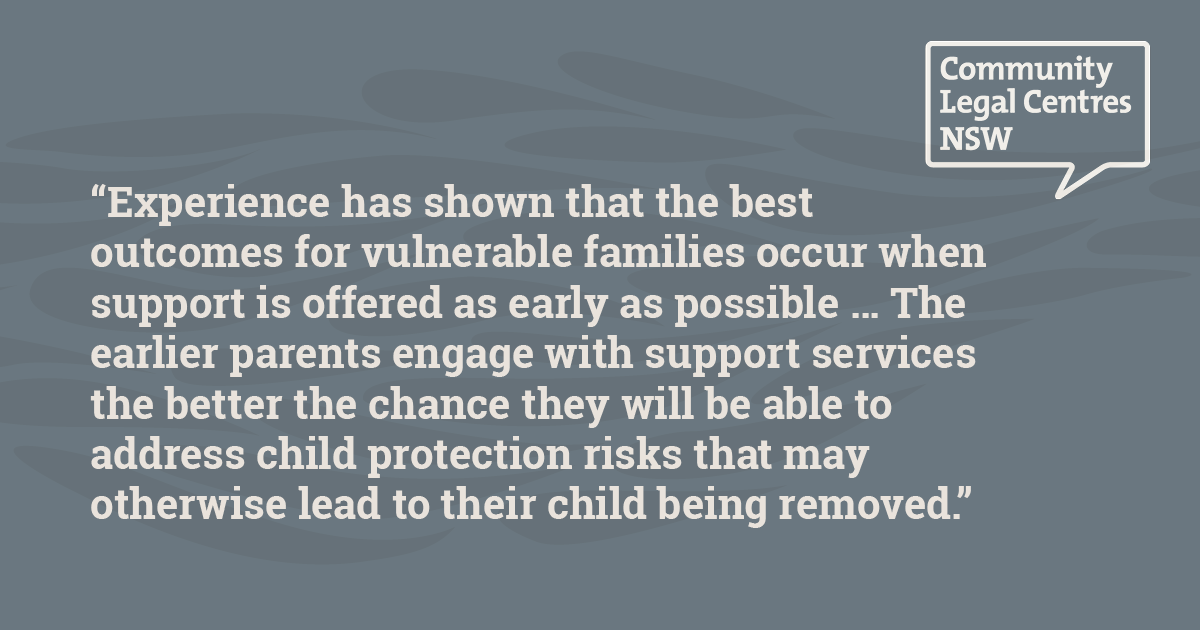
Article by Kenn Clift (Solicitor, Parents with Intellectual Disability) and Julia Wren (Parents Project (Care And Protection) Care Manager / Advocate), Intellectual Disability Rights Service.
The Intellectual Disability Rights Service (IDRS) Parents’ Program provides legal advice and representation and specialist non-legal assistance to parents with intellectual disability who are involved with the Department of Family and Community Services (FACS) across NSW. The program has a strong record of family preservation when working with parents prior to care applications being made, including in cases where parents already have children in Out of Home Care; it has also increased the meaningful participation of parents with intellectual disability in their care applications.
What the Parents’ Program Does
The Parents’ Program began in response to the over-representation of parents with intellectual disability in care and protection matters in the Children’s Court. The Program employs a lawyer and a specialist non-legal parent advocate four days per week and combines legal and advocacy strategies to ensure parents with intellectual disability are fairly treated throughout the process and are given the best chance to raise their children.
The lawyer and parent advocate work together on some matters and separately or collaboratively with non-IDRS lawyers and advocates on others. Program staff have specialist skills and expertise in supporting people with intellectual disability in legal contexts.
The program offers:
- phone advice and legal consultations for parents with intellectual disability in care and protection matters throughout NSW;
- non-legal advocacy and support for parents who have had or are at risk of having a child removed, including during pregnancy;
- community legal education and capacity building with FACS caseworkers, disability support workers and lawyers so that they can better understand and work with parents with intellectual disability; and
- systemic advocacy for changes in policy and laws that will improve fairness and outcomes for parents with intellectual disability.
IDRS has also trialed a volunteer court support service for parents with intellectual disability in care and protection matters in the Children’s Court.
Based in Sydney, and with limited resources, legal representation and intensive, face-to-face non-legal advocacy is largely restricted to the greater Sydney area.
Why is early support important?
Experience has shown that the best outcomes for vulnerable families occur when support is offered as early as possible – ideally during pregnancy. As a rule of thumb, it is easier to prevent a child entering care than attempting to have a child restored once they have been taken. The earlier parents engage with support services the better the chance they will be able to address child protection risks that may otherwise lead to their child being removed.
People with intellectual disability experience unique barriers to effective early engagement with support services. These include:
- low or no literacy;
- gratuitous agreement and false competence (saying yes because the person thinks that is the answer that that will be most pleasing and will make them appear as though they have understood);
- Pessimistic, stereotypical and discriminatory social attitudes to the capacity of people with intellectual disability to parent effectively; and
- Social isolation and marginalisation.
These difficulties are often compounded by past trauma, including parents’ own past history of engagement with FACS.
Early support from an experienced parent advocate can help to ensure parents with intellectual disability:
- understand FACS’ safety concerns for their children and what they need to do to address those concerns;
- have timely access to reasonable and necessary supports to help them keep their children safe at home;
- are supported to participate in decision-making about the care arrangements for their children and to work collaboratively with FACS to address their concerns; and
- are treated fairly and respectfully by FACS, the court system and other service providers throughout the process.
Outcomes
In 2017-18, the Program’s Parent Advocate worked with nine expectant mothers. FACS was already involved with many of these families. The Advocate helped the women talk with FACS and understand what they needed to do to address FACS’ concerns and be able to take their children home. The Advocate also worked with them to prepare for parenthood and to access the support services they needed. For many mothers, this included helping them to apply for an NDIS funding package.
Of the nine mothers supported during pregnancy, seven were able to take their babies home from hospital and have continued to care for them. This is a particularly good outcome because five of the seven mothers had previously had babies removed from their care and this was the first time they had been able to keep the care of their child.

